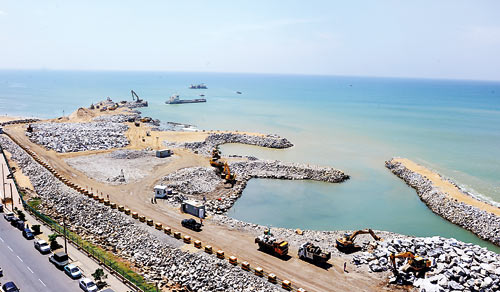Megapolis -the panacea for all ills?
 Megapolis has become the current hot topic of discussion only second in priority to the Constitutional Reforms’ riddle facing the country.
Megapolis has become the current hot topic of discussion only second in priority to the Constitutional Reforms’ riddle facing the country.
Portrayed as a novel concept much needed above other immediate requirements in the country’s rapid development programmes it has come to stay as another silently digested proposal with not much criticism from the opposition heavy weights. In the context of the financial state and other social circumstances the country is facing it deserves to be viewed in a realistic sense to ascertain the prudency of an involvement of such a magnitude far exceeding all other development activities the country has launched hitherto.
The new airport, harbour and an array of highly sophisticated projects including the second largest Convention Centre, the International Cricket ground, etc. located in the Hambantota area considered to be extravagant dispositions than absolute necessities, are still fresh in our minds. It is also said that there is no alternative but to proceed with the Mega Port City project despite being branded as a pure-white elephant by none other than the politicians in power today. How productive these are and how they have burdened the country’s economy are matters currently debated with much discontent.
In such a scenario it would appear to ordinary people whether the powers that have entered into a mad race to out-beat the former regimes in mega deals without much consideration of the consequences and the commitments. To make matters worse the recent election promises and great expectations given to the voters, such as the Volkswagen Factory in Kuliyapitiya, GSP for garment exports to European countries, the expected huge influx of foreign investment, removal of fish import ban imposed by EU countries, are fast subliming.
On the other hand the basic humanitarian social infrastructure needs still awaiting to be properly addressed are beginning to cause alarming concerns among the people. Long unattended poverty line basics such as rural transport issues, facilities in remote area schools, lack of basic requirements in hospitals, issues concerning drinking water and water supplies for agriculture are some of the matters the voters demand to be addressed by the government speedily. Are the people ready to sacrifice their rudimentary rights during their balance short life span for the Utopian concepts which do not cover the immediate relief sought by those affected? While prudent long term planning in keeping with the modern global trends is a must these preferences and priorities have to be borne in the mind by the planners.
There appears to be a conflict with regard to the direction underlying basic development policies of the Government. While one school of thought advocates a more sober approach such as leaving the villages to be villages and townships to be only developed to better ones, the other school of thought prevails on a more aggressive creation of huge conglomerates which appear to be quite out of proportion to the country’s advancement process. Policies should not be ratified merely because they are someone’s pipe dreams.
Mega projects and policy plans involving huge financial commitments should be the subject of discussion and representations at the broadest possible policy planning level over a period of a reasonable timeframe providing the opportunity for different views. Mere germination of an idea or the desire to fulfill a viewpoint seen by many as a fantasy should not be hastily converted to a working plan costing the country colossal amounts that could otherwise be used for the realisation of most needy expectations of the people. Those who opened the gates finding they had deceived themselves in their expectations and as regards the benefits they had anticipated may soon be disappointed in waiting indefinitely!
(The writer is a former
veteran banker turned social activist. He could be reached at rusiri41@sltnet.lk)


